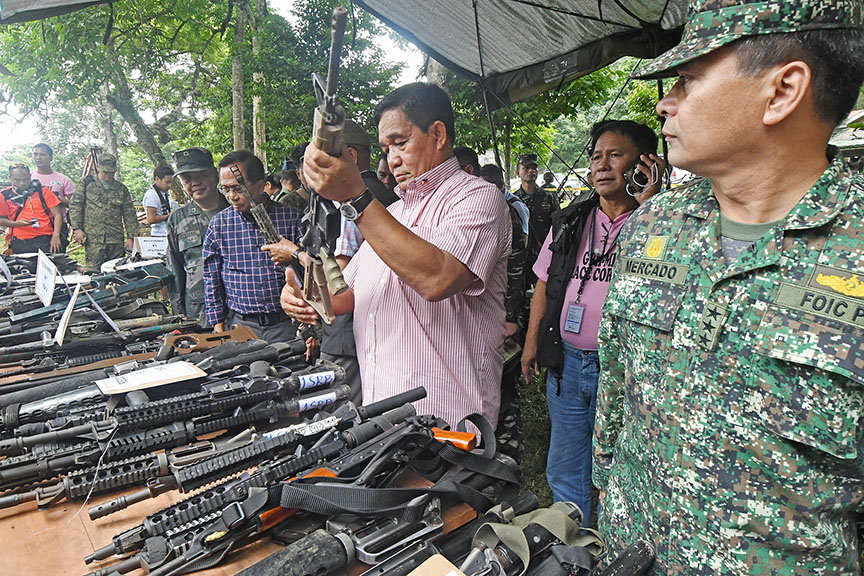(National Security Adviser Hermogenes Esperon sent this piece to MindaNews via e-mail on 17 June 2020, referring to it as “Personal statement on the Anti-Terrorism Bill of 2020”)
The “Anti-Terrorism Act of 2020” is simply a matter of necessity, as the Philippines in 2019 – is the only country from our region that is on the Top 10, amongst the most impacted by terrorism.
In the public discourse, the security perspective is often conveniently disregarded. Perhaps a more practical way to look at the issue is to consider the human costs of terrorism. Truth is, violent extremism, often ends in blood.
 HELLO NUR. President Rodrigo Duterte calls Moro National Liberation Front (MNLF) founding chair Nur Misuari after approving the Peace Roadmap presented by Presidential Adviser on the Peace Process Jesus Dureza at the State Dining Room in Malacañan Palace on Monday evening, July 18, 2016. Beside the President is National Security Adviser Hermogenes Esperon Jr. TOTO LOZANO/PPD
HELLO NUR. President Rodrigo Duterte calls Moro National Liberation Front (MNLF) founding chair Nur Misuari after approving the Peace Roadmap presented by Presidential Adviser on the Peace Process Jesus Dureza at the State Dining Room in Malacañan Palace on Monday evening, July 18, 2016. Beside the President is National Security Adviser Hermogenes Esperon Jr. TOTO LOZANO/PPD
Consider the perspective of the safety and well-being of our soldiers. My heart always go out to them, because I have walked in their boots. Although for us, to perish in the line of duty is an accepted fate.
What is unacceptable is that the evil we are up against is indiscriminate. It only wants to destroy. Combatants and non-combatants alike are targeted.
Imagine the horror of an innocent’s exposure to terrorism or even death, will undoubtedly reverberate in the lives of their respective families, which are forever altered.
Our men in uniform, our people, it is them who are in actual risk. From a purely human perspective, how could we fail to consider them? Their stories, and their voices should matter.
Also consider the social dimension of the issue, which cannot be separated from the terrorism threat.
Families are being torn-apart. Children are recruited into violent extremism, as child-combatants. To a broader extent, communities and institutions severely suffer. Terrorism has displaced communities, and left properties to ruins.
Over 1.5m Filipinos in the islands of Basilan, Sulu and Tawi-tawi, are currently living in actual and constant threat of terrorism. In these provinces, there are over 63% of poverty incidences, proof that they are starving for development.
The issue is multi-dimensional. We have to consider various perspectives. The point is, “multiple truths can exist at the same time and within the same plane.” If you fail to consider the truths of the primary beneficiaries of the law, which are our people, our police, and our soldiers – then your argument is but a fruit of a flawed and limited view.
Our history also has its own truth to tell. That terrorism has been a domestic problem way before 9/11. The Abu Sayyaf Group (ASG) has been launching attacks as early as 1991; even much earlier than them are violent elements of the MNLF (Moro National Liberation Front) and MILF (Moro Islamic Liberation Front). More importantly, the “Bojinka plot” in 1994 that plotted to bomb commercial flights and the orchestrated Rizal Day bombings in 2000, which showed us the transnational nature of terrorism.
Myself, I’ve been face-to-face with terrorism throughout my career. I felt the impact of the BIFF (Bangsamoro Islamic Freedom Fighters)-initiated violence in Mindanao, including the series of bombings in 2000. I also witnessed the ASG wreak havoc in Basilan. I’ve led in the pursuits to rescue the Dos Palmas kidnapping victims from the hands of their terrorist captors in 2001.
Also notable are the Davao City airport bombing in 2003; the Super Ferry 14 bombing in 2004; and the recent Jolo Cathedral attacks in 2019.
What is unfortunate is that our isolation from the threat have caused most of us to become desensitized (to the point of becoming oblivious) to the true state of our troubled regions.
How soon did we forget that we all wept for the SAF (Special Action Force) 44 and witnessed Marawi crumble brick-by-brick?
 National Security Adviser Hermogenes Esperon inspects a firearm captured by government troops during his visit in Kampo Ranao in Marawi City on Thursday (8 June 2017). MindaNews photo by FROILAN GALLARDO
National Security Adviser Hermogenes Esperon inspects a firearm captured by government troops during his visit in Kampo Ranao in Marawi City on Thursday (8 June 2017). MindaNews photo by FROILAN GALLARDO
Think back to the many other occasions in history, where we all accused government for ‘failure of intelligence’ and called for reforms and swift action.
Yet in the here and now, in this decisive move to support our campaign against terrorism – why are we uncomfortable? Did the threat suddenly cease?
On the contrary, local and foreign terrorists are still at-large, and the threat continues to persist.
The proposed Anti-Terrorism Act we have at hand had been in the legislative mill for more than three years. It was authored by experts in law enforcement and improved upon consultation with respected legal minds.
Senate Bill 1083 takes counsel from international standards and The United Nations Security Council and its office of counter terrorism.
I sincerely believe that if enacted into law, this Anti-Terrorism Act will promote and nurture a culture of orderliness, legality and security.
[Retired General Hermogenes Esperon, National Security Adviser and Director-General of the National Secruity Council, was former Armed Forces Chief of Staff from July 2006 to May 2008. He served in various areas in Mindanao – Basilan, Sulu, Zamboanga, Agusan, North Cotabato. Under his command as AFP Chief of Staff, the Southern Command (SouthCom) was divided into Western Mindanao Command and Eastern Mindanao Command. He was also Presidential Adviser on the Peace Process in 2008]
